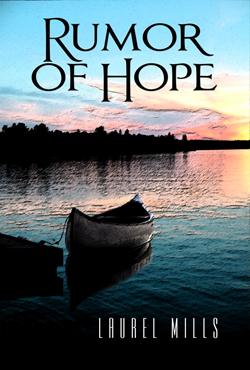Book Review
Laurel Mills, Rumor of Hope, Encircle Publications, 2012
by Ronnie Hess
Rumor of hope. Were these words not also the title of Laurel Mills’ award-winning chapbook, they might be lost among the author’s new collection of poetry. You find them in the last line of the last poem, in “Cottage on the Chain of Lakes,” almost as if they were meant to be hidden, or an afterthought, even a clue to something scarcely to be believed or wished. And yet the words carry everything, underscoring the chapbook’s essential grace as well as artistic restraint.
What Mills chronicles through two dozen poems in Rumor of Hope is illness, specifically a rare genetic condition named 1p36 Deletion Syndrome. As Mills explains at the very end of the work, “material is missing from the end of chromosome one.” The syndrome can cause intellectual stunting and behavioral disorders, and this is the case with Mills’ eldest daughter Beth.
The damage wreaked by 1p36 Deletion Syndrome (unnamed in the poems), its cruel influence not just on Beth, but on her mother, Beth’s younger sister Marissa, and the caregivers in a group home, form the narrative arc of the work.
These are poems that are not easy to read. They are raw, searing descriptions of Beth’s self-wounding, of violence an inch away from others. Mills tells us what’s at stake in the collection’s first poem, “Thinking of Beth as I Walk Among Flowers.” She writes, “In brilliant/Sweet William I see blood that could spill/when Beth raises a fork to her roommate’s back.” In the following poem, “Parking Next to a Special Needs Pre-School,” Mills remembers when her daughter was young, “when the little/yellow school bus carried her into her mornings -/when we thought we could change everything.” Or, as Mills describes her ministrations to her daughter in “How to Handle a Home Visit,” “Change sheets in the bedroom/where last night she switched/the space heater to high./Calm your heart as you/remove the seared blanket,/replace her charred pillow.” We sense being one step away from calamity.
And yet, this is not a chapbook about loss or even regret but of keen comprehension and compassion, even love, a word Mills scarcely uses but which issues from Beth’s mouth. “I luf you, Mom,” Beth says in Mills’ poem, “Baking Cookies.” And Mills writes, “No gift is sweeter: red-and-green apron/high on her waist, flour on her cheek,/words that waited these many years to spill from the bell of her tongue.”
Such wonderful arrangements of words, those, “bell of her tongue,” “maternal bowl,” “ceremonies of air,” to highlight a few.
It is not just Beth’s travails that we hear about nor those of the mother. There are moments of domesticity, where Beth and Mills dress the daughter’s baby doll Edie (even though by now Beth is approaching middle-age), when they go camping, when sisters as toddlers “bathed together/ in a clawfoot tub,” or years later swim together off a pier. In these moments, Beth speaks along with Mills, poet as well as mother taking her daughter’s halting words, “never fully formed/ in the chamber of her mouth,” juxtaposing them with her own poetry. It is this doubled perspective through language, these contrasts, that inform the entire chapbook.
Mills crafts her poems so that nothing is simple or one-sided. Her world, her poems are full of both light and shadow, gentleness and cruelty. In one of the strongest poems of the collection, “Sometimes the Sun Forgets,” perhaps she speaks for all parents who “commit our children to this life,” daring to ask what if, what if something goes wrong? “If we were/to see the bare truth, would we ever/ let those cells multiply/in the pelvic cradle of our bodies?” A haunting thought.
Mills’ terrain is both the normal and aberrant, unusual and predictable, fearful and sweet, and yet ultimately she sees these contrasts as part of a whole. A few examples: In “Thinking of Beth as I Walk Among Flowers,” “The lushness of this May/after two years of drought, one of spring/stammering its way back. All I can think/as I pull weeds from trailing dianthus/is let me do the loving thing.” In “Every Breath Is Borrowed,” Mills explores intimations of mortality, her daughter “lying full-length in a little valley of grass,” asleep, the mother ever observing, wondering if she is breathing, even “practicing her death.”
Which brings me back to the chapbook’s title and its last poem. Mills and her daughter, just released from six months “under lock and key,” have taken the canoe out “to venture into unknown water.” They come upon a great blue heron who “watches cautiously on stick legs/as we glide by. We can see below/to stones that glitter in the sun./Weeds wave and sway in the river/like a rumor of hope.” Nothing is ever sure but we ferry on, catching the marvelous, if we can.
Rumor of Hope was the winner of the 2012 Encircle Publication’s Chapbook Contest. The book also received first prize in the Wisconsin Fellowship of Poets 2013 Wisconsin Chapbook competition. http://laurelmills.net/
Ronnie Hess’ poetry has appeared in several publications, including Alimentum, Arbor Vitae, and Wisconsin People & Ideas. She is the author of a chapbook, Whole Cloth: A Poem Cycle (Little Eagle Press, 2009), and a culinary travel guide, Eat Smart in France (Ginkgo Press, 2010).


